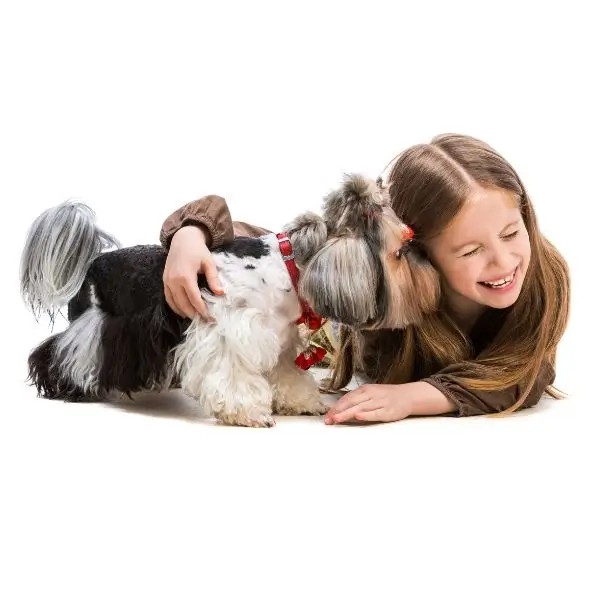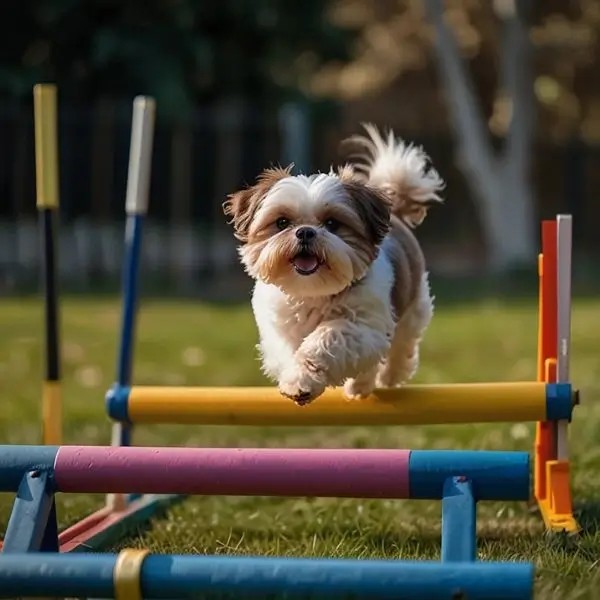Why are Shih Tzus the worst dog breed? That’s a loaded question! Contrary to popular misconceptions, Shih Tzus are actually wonderful companions, known for their affectionate nature and adaptability. At WHY.EDU.VN, we’ll debunk the myth that Shih Tzus are the worst dogs and highlight why they make fantastic pets, offering insights into their behavior, care, and unique charm. Discover the truth about these furry friends and find out why they’re often misunderstood.
1. What Makes People Think Shih Tzus Are The Worst Dogs?
The perception that Shih Tzus are the “worst dogs” often arises from misunderstandings about their temperament, grooming needs, and training challenges. Here’s a breakdown of common reasons and why they’re often unfounded:
- Stubbornness: Some perceive Shih Tzus as stubborn and difficult to train.
- High Maintenance Grooming: Their long, luxurious coat requires regular grooming, which can be seen as time-consuming.
- Health Issues: They can be prone to certain health problems, leading some to believe they are delicate or high-maintenance.
- Barking: They may bark frequently, which can be annoying for some owners.
- Small Dog Syndrome: If not properly trained and socialized, they can exhibit “small dog syndrome,” leading to bossy or anxious behavior.
It’s crucial to address each of these concerns with facts and solutions.
2. Are Shih Tzus Really Stubborn and Difficult to Train?
While Shih Tzus may have an independent streak, they are intelligent and trainable with the right approach. According to a study by the American Kennel Club, Shih Tzus respond well to positive reinforcement techniques. Patience and consistency are key.
- Positive Reinforcement: Use treats, praise, and toys to reward good behavior.
- Short Training Sessions: Keep training sessions short and engaging to maintain their interest.
- Consistency: Consistent commands and routines will help them understand what is expected.
- Early Socialization: Expose them to various people, places, and situations early on to prevent behavioral issues.
3. Is It True That Shih Tzus Require High-Maintenance Grooming?
Yes, Shih Tzus have a long, double coat that requires regular grooming, but it doesn’t have to be overwhelming. Regular grooming not only keeps them looking their best but also prevents painful matting and skin issues.
- Daily Brushing: Brush their coat daily to prevent tangles and mats.
- Regular Baths: Bathe them every 2-3 weeks with a dog-specific shampoo.
- Professional Grooming: Consider professional grooming every 4-6 weeks for trimming and styling.
- Facial Cleaning: Clean their face daily to prevent tear stains.
4. What Health Issues Are Shih Tzus Prone To?
Like all breeds, Shih Tzus are predisposed to certain health issues, but responsible breeding and proper care can mitigate these risks.
| Health Issue | Description | Preventive Measures |
|---|---|---|
| Brachycephalic Syndrome | Breathing difficulties due to their short noses. | Avoid strenuous exercise in hot weather, use a harness instead of a collar. |
| Eye Problems | Including cataracts, progressive retinal atrophy (PRA), and dry eye. | Regular vet check-ups, proper eye hygiene. |
| Patellar Luxation | Dislocation of the kneecap. | Maintain a healthy weight, avoid excessive jumping. |
| Intervertebral Disc Disease (IVDD) | Spinal disc problems. | Avoid jumping, use ramps or stairs. |
| Allergies | Can be prone to skin and food allergies. | Feed a high-quality diet, identify and avoid allergens. |



Regular vet visits, a healthy diet, and appropriate exercise can help manage and prevent these health issues.
5. Why Do Shih Tzus Bark So Much?
Shih Tzus are naturally alert and may bark to alert their owners to potential threats or strangers. While barking is a natural behavior, excessive barking can be managed with training.
- Identify the Cause: Determine why your Shih Tzu is barking (e.g., boredom, anxiety, territoriality).
- Training: Teach commands like “Quiet” or “No Bark.”
- Exercise and Mental Stimulation: Provide plenty of exercise and mental stimulation to reduce boredom and anxiety.
- Ignore the Barking: If the barking is attention-seeking, ignore it until they stop, then reward them.
6. What is “Small Dog Syndrome,” and How Does it Affect Shih Tzus?
“Small Dog Syndrome” refers to a set of behaviors seen in small breeds where they act aggressively, defensively, or anxiously due to feeling vulnerable. This often results from owners not correcting behaviors they might find “cute” in a small dog but would address in a larger breed.
-
Common Symptoms:
- Excessive barking
- Growling or snapping
- Jumping on people
- Refusing to obey commands
- Aggression towards other dogs
-
Prevention and Management:
- Consistent Training: Apply the same training principles as you would with a large dog.
- Socialization: Expose them to various people and dogs from a young age.
- Leadership: Establish yourself as the leader through consistent commands and boundaries.
7. How Can You Handle a Shih Tzu’s Picky Eating Habits?
Some Shih Tzus can be picky eaters, but this can be managed by establishing a consistent feeding routine and offering a balanced diet.
- Consistent Feeding Schedule: Feed them at the same times each day.
- High-Quality Food: Choose a high-quality dog food that meets their nutritional needs.
- Limited Treats: Avoid giving too many treats, as this can make them less interested in their regular food.
- Variety: If they are truly picky, try different flavors or textures of dog food to see what they prefer.
8. Are Shih Tzus Good with Children and Other Pets?
Shih Tzus are generally good with children and other pets, but early socialization is key. Their friendly and affectionate nature makes them excellent family companions.
- Supervision: Always supervise interactions between Shih Tzus and young children to ensure gentle handling.
- Early Socialization: Introduce them to children and other pets from a young age.
- Respectful Interactions: Teach children how to interact respectfully with the dog, avoiding pulling ears or tails.
9. What is the Ideal Living Environment for a Shih Tzu?
Shih Tzus are adaptable and can thrive in various living environments, including apartments and houses. Their small size and moderate exercise needs make them ideal for apartment living.
- Apartment Living: They don’t require a lot of space and are happy with indoor play and short walks.
- Houses with Yards: They also enjoy having access to a yard for play and exploration.
- Climate Considerations: They are sensitive to extreme temperatures due to their short noses and thick coats, so be mindful of hot and cold weather.
10. How Much Exercise Does a Shih Tzu Need?
Shih Tzus have moderate exercise needs and benefit from daily physical and mental stimulation.
- Daily Walks: A 20-30 minute walk each day is sufficient.
- Indoor Play: Engage them in indoor play sessions with toys and games.
- Mental Stimulation: Provide puzzle toys and training exercises to keep their minds active.
11. What Are the Best Toys for a Shih Tzu?
Choosing the right toys can keep your Shih Tzu entertained and mentally stimulated.
- Plush Toys: Soft, squeaky plush toys for cuddling and gentle play.
- Puzzle Toys: Interactive toys that dispense treats and challenge their problem-solving skills.
- Chew Toys: Durable chew toys to satisfy their natural chewing instincts.
- Fetch Toys: Small balls or frisbees for games of fetch.
12. Are Shih Tzus Hypoallergenic?
While no dog is completely hypoallergenic, Shih Tzus produce less dander than some other breeds, making them a better option for some allergy sufferers.
- Dander Reduction: Their coat type can reduce the amount of dander released.
- Regular Grooming: Frequent bathing and grooming can further minimize allergens.
- Consult an Allergist: If you have allergies, spend time with a Shih Tzu before bringing one home to see if you have a reaction.
13. Can Shih Tzus Handle Travel Well?
With proper preparation, Shih Tzus can be excellent travel companions.
- Travel Crate: Use a comfortable and secure travel crate or carrier.
- Familiar Items: Bring along familiar items like a blanket or toy to help them feel secure.
- Regular Stops: Take regular stops for bathroom breaks and exercise during long journeys.
- Airline Policies: If traveling by air, familiarize yourself with the airline’s pet policies.
14. What Kind of Temperament Can You Expect From a Shih Tzu?
Shih Tzus are known for their affectionate, playful, and loyal temperament.
- Affectionate: They form strong bonds with their owners and love to cuddle.
- Playful: They have a playful side and enjoy interactive games.
- Loyal: They are incredibly devoted to their families.
- Gentle: They are gentle and good with children and other pets.
15. How Can I Find a Reputable Shih Tzu Breeder?
Finding a reputable breeder is crucial to ensure you get a healthy and well-adjusted puppy.
- Ask for Referrals: Seek recommendations from veterinarians, groomers, or other dog owners.
- Visit the Breeder: Visit the breeder’s facility to see the living conditions and meet the parent dogs.
- Health Testing: Ask about health testing and genetic screening for common breed-specific issues.
- Temperament: Observe the temperament of the parent dogs to get an idea of what to expect from the puppies.
16. What is the History of the Shih Tzu Breed?
The Shih Tzu has a rich history dating back to ancient Tibet, where they were highly prized companions of royalty.
- Origin: They originated in Tibet and were given as gifts to Chinese emperors.
- Royal Breed: They were considered a sacred breed and were kept in the imperial palace.
- Modern Popularity: Today, they are beloved family pets around the world.
17. What Are Some Common Misconceptions About Shih Tzus?
Addressing misconceptions can help people understand and appreciate the breed better.
- They Are High-Maintenance: While they require grooming, it doesn’t have to be overwhelming.
- They Are Stubborn: With the right training approach, they are intelligent and trainable.
- They Are Delicate: With proper care, they are generally healthy dogs.
- They Are Not Good with Children: They are gentle and good with children with proper socialization and supervision.
18. How Do Shih Tzus Adapt to Different Lifestyles?
Shih Tzus are highly adaptable and can thrive in various lifestyles.
- Singles: They make great companions for single people.
- Families: They are excellent family pets and get along well with children and other pets.
- Seniors: Their low exercise needs make them ideal for seniors.
19. What Makes Shih Tzus Great Emotional Support Animals?
Their affectionate and loyal nature makes them excellent emotional support animals.
- Companionship: They provide companionship and reduce feelings of loneliness.
- Comfort: They offer comfort and support during times of stress.
- Routine: Caring for them can provide a sense of routine and purpose.
20. How Can I Keep My Shih Tzu Happy and Healthy?
Keeping your Shih Tzu happy and healthy involves proper care, training, and attention.
- Balanced Diet: Feed them a high-quality diet.
- Regular Exercise: Provide daily physical and mental stimulation.
- Grooming: Maintain their coat with regular brushing and grooming.
- Vet Visits: Schedule regular vet check-ups for preventive care.
- Love and Attention: Give them plenty of love and attention to strengthen your bond.
In conclusion, the notion that Shih Tzus are the “worst dogs” is simply not true. With proper care, training, and understanding, they make wonderful, loving, and adaptable companions. At WHY.EDU.VN, we encourage you to explore more about this delightful breed and discover why they are cherished by so many.
Facing challenges in finding reliable answers to your pet questions? Unsure where to turn for expert advice? At WHY.EDU.VN, we understand the difficulties of navigating the complexities of pet ownership. Our platform connects you with experienced professionals who can provide tailored solutions and insights. Don’t let uncertainty hold you back—visit WHY.EDU.VN today to ask your questions and discover the support you need to ensure your Shih Tzu thrives.
Contact Us:
Address: 101 Curiosity Lane, Answer Town, CA 90210, United States
Whatsapp: +1 (213) 555-0101
Website: why.edu.vn
FAQ About Shih Tzus
1. Are Shih Tzus good for first-time owners?
Yes, Shih Tzus can be good for first-time owners due to their adaptable nature and moderate exercise needs, provided the owners are prepared to handle their grooming requirements and training.
2. Do Shih Tzus shed a lot?
Shih Tzus are considered low-shedding dogs, which makes them suitable for people with mild allergies. Regular grooming can further minimize shedding.
3. How big do Shih Tzus get?
Shih Tzus typically weigh between 9 to 16 pounds and stand about 8 to 11 inches tall at the shoulder.
4. Are Shih Tzus easy to housebreak?
Shih Tzus can be a bit challenging to housebreak due to their small bladder size and independent nature. Consistency and patience are key to successful housebreaking.
5. What is the average lifespan of a Shih Tzu?
The average lifespan of a Shih Tzu is between 10 to 16 years, with proper care and a healthy lifestyle.
6. Do Shih Tzus need a lot of attention?
Yes, Shih Tzus thrive on attention and companionship. They are happiest when they are with their families and can become anxious if left alone for long periods.
7. Are Shih Tzus prone to separation anxiety?
Yes, Shih Tzus can be prone to separation anxiety if not properly trained. Gradual desensitization and plenty of mental stimulation can help prevent this issue.
8. How often should I groom my Shih Tzu?
You should brush your Shih Tzu daily and bathe them every 2-3 weeks. Professional grooming is recommended every 4-6 weeks to keep their coat in good condition.
9. What are some signs of a healthy Shih Tzu?
Signs of a healthy Shih Tzu include a shiny coat, bright eyes, good appetite, and regular bowel movements. Regular vet check-ups are essential for maintaining their health.
10. Can Shih Tzus tolerate hot weather?
Shih Tzus are sensitive to hot weather due to their short noses and thick coats. It is important to keep them cool and avoid strenuous exercise during hot days.
